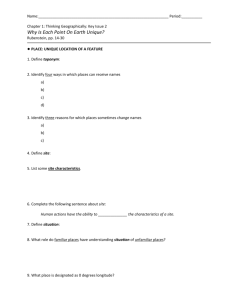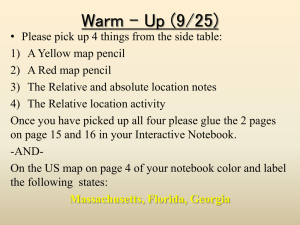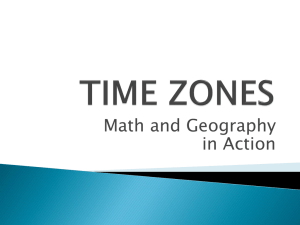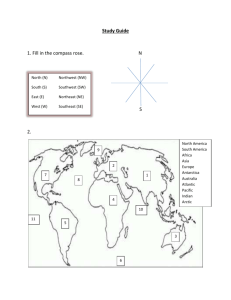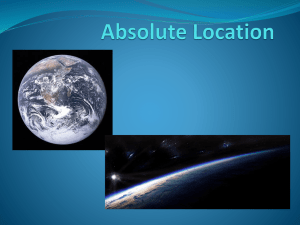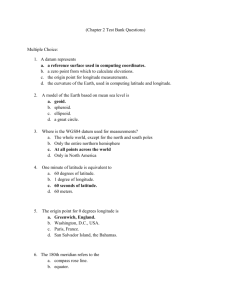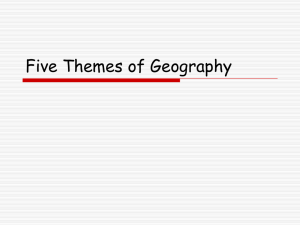Name - Port Washington Schools
advertisement
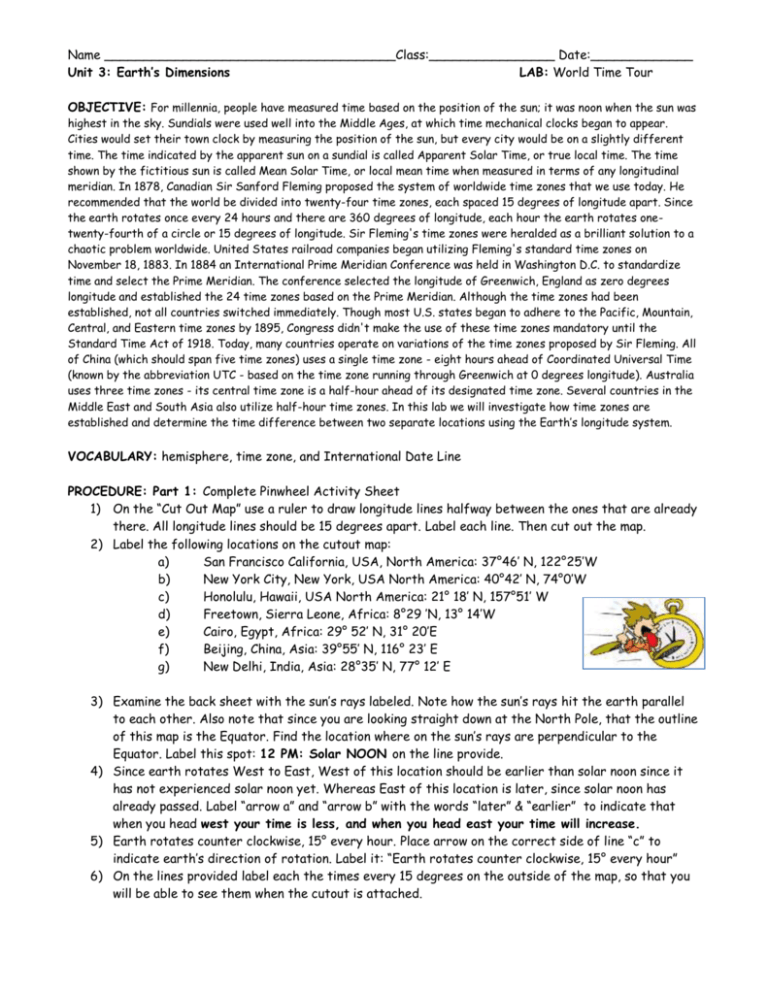
Name _____________________________________Class:________________ Date:_____________ Unit 3: Earth’s Dimensions LAB: World Time Tour OBJECTIVE: For millennia, people have measured time based on the position of the sun; it was noon when the sun was highest in the sky. Sundials were used well into the Middle Ages, at which time mechanical clocks began to appear. Cities would set their town clock by measuring the position of the sun, but every city would be on a slightly different time. The time indicated by the apparent sun on a sundial is called Apparent Solar Time, or true local time. The time shown by the fictitious sun is called Mean Solar Time, or local mean time when measured in terms of any longitudinal meridian. In 1878, Canadian Sir Sanford Fleming proposed the system of worldwide time zones that we use today. He recommended that the world be divided into twenty-four time zones, each spaced 15 degrees of longitude apart. Since the earth rotates once every 24 hours and there are 360 degrees of longitude, each hour the earth rotates onetwenty-fourth of a circle or 15 degrees of longitude. Sir Fleming's time zones were heralded as a brilliant solution to a chaotic problem worldwide. United States railroad companies began utilizing Fleming's standard time zones on November 18, 1883. In 1884 an International Prime Meridian Conference was held in Washington D.C. to standardize time and select the Prime Meridian. The conference selected the longitude of Greenwich, England as zero degrees longitude and established the 24 time zones based on the Prime Meridian. Although the time zones had been established, not all countries switched immediately. Though most U.S. states began to adhere to the Pacific, Mountain, Central, and Eastern time zones by 1895, Congress didn't make the use of these time zones mandatory until the Standard Time Act of 1918. Today, many countries operate on variations of the time zones proposed by Sir Fleming. All of China (which should span five time zones) uses a single time zone - eight hours ahead of Coordinated Universal Time (known by the abbreviation UTC - based on the time zone running through Greenwich at 0 degrees longitude). Australia uses three time zones - its central time zone is a half-hour ahead of its designated time zone. Several countries in the Middle East and South Asia also utilize half-hour time zones. In this lab we will investigate how time zones are established and determine the time difference between two separate locations using the Earth’s longitude system. VOCABULARY: hemisphere, time zone, and International Date Line PROCEDURE: Part 1: Complete Pinwheel Activity Sheet 1) On the “Cut Out Map” use a ruler to draw longitude lines halfway between the ones that are already there. All longitude lines should be 15 degrees apart. Label each line. Then cut out the map. 2) Label the following locations on the cutout map: a) San Francisco California, USA, North America: 37°46’ N, 122°25’W b) New York City, New York, USA North America: 40°42’ N, 74°0’W c) Honolulu, Hawaii, USA North America: 21° 18’ N, 157°51’ W d) Freetown, Sierra Leone, Africa: 8°29 ’N, 13° 14’W e) Cairo, Egypt, Africa: 29° 52’ N, 31° 20’E f) Beijing, China, Asia: 39°55’ N, 116° 23’ E g) New Delhi, India, Asia: 28°35’ N, 77° 12’ E 3) Examine the back sheet with the sun’s rays labeled. Note how the sun’s rays hit the earth parallel to each other. Also note that since you are looking straight down at the North Pole, that the outline of this map is the Equator. Find the location where on the sun’s rays are perpendicular to the Equator. Label this spot: 12 PM: Solar NOON on the line provide. 4) Since earth rotates West to East, West of this location should be earlier than solar noon since it has not experienced solar noon yet. Whereas East of this location is later, since solar noon has already passed. Label “arrow a” and “arrow b” with the words “later” & “earlier” to indicate that when you head west your time is less, and when you head east your time will increase. 5) Earth rotates counter clockwise, 15° every hour. Place arrow on the correct side of line “c” to indicate earth’s direction of rotation. Label it: “Earth rotates counter clockwise, 15° every hour” 6) On the lines provided label each the times every 15 degrees on the outside of the map, so that you will be able to see them when the cutout is attached. 7) Attach your cut out map and use your Time Zone Wheel to complete the following Chart: CITY MOMENT IN TIME A MOMENT IN TIME B San Francisco 1 PM 10 AM New York Honolulu Freetown Cairo Beijing New Delhi PROCEDURE: Part 2: 1. Look at the World Map page. Staring frim the prime meridian, carefully measure and draw longitude lines every fifteen degrees. Using your colored pencils shade every other column with a color of your choice. 2. Assuming it is noon at the Prime meridian, write the times along the longitudinal lines in the World map. 11:00 and noon have been completed for you. 3. Plot each city from the chart below, onto the world map. Use the letter in front of the city to mark it’s location on the World Map. 4. Complete the time column of the cities of the World Chart below. London, England has been done for you. Cities of the World: City Latitude Longitude Time A London, England 51°N 0° Noon B Reykjavik, Iceland 64°N 21°W C Rio de Janeiro, Brazil 22°S 43°W D Cape Town, South Africa 33°S 18°E E New York City, USA 40°N 74°W F Sydney, Australia 33°S 151°E G Yucatan, Mexico 20°N 89°W H Christchurch, New Zealand 43°S 172°E I Vancouver, Canada 49°N 123°W J Puerto Williams, Chile 54°S 67°W Observations: 1. What direction does the sun rise? _______________________________ 2. Think about question 1, which location would reach noon first? A city on the eastern side of Long Island (Suffolk County) or a city on the western side of Long Island (Nassau County)?____________________________________________________________ 3. About how wide in degrees do you think a time zone should be? 4. What is your time zone? ______________________________________ 5. Which city will see noon first, Rio de Janeiro or NYC? _________________________ 6. What is the calculated diffence in time between Rio de Janeiro and NYC? ________ 7. What is the difference in degrees in longitude between Yucatan Mexico and London, England? 8. Which city would see noon first, Cape Town or London? 9. At midnight the residents of Tokyo, Japan (35°N, 139°E) have just rung in the New Year. Based on this information, what is the date and time of the residents of Los Angeles, California (34°N, 118°W)? __________________________________ PROCEDURE: Part 3: 1. Pick two vacation getaway spots on different continents that you would like to visit. After choosing your vacation spots, list the latitude and longitude of each location. 2. Assuming the longitude of Long Island is 75W, determine the difference in longitude between your vacation spot and your house. To find out the time difference between two locations, find the total number of degrees on longitude between them. (Hint: If both locations are in the same hemisphere subtract their longitudes, and if they are in opposite hemispheres add their longitudes). 3. Once you have the total number of degrees of longitude between the two location, simply divide by 15/hour (the rate of rotation) to find out how many hours separate the locations. 4. Indicate if your parents picking up the phone when you call from your destination at midnight are either ahead or behind your local midnight time with a plus or minus sign. 5. Now that you want to call your family and friends from your vacation haven, calculate what time they will receive the call if you phone them from your destination at 12:00 midnight. (Hint: If Long Island is east of you, it’s later here. If Long Island is west of you it’s earlier here.) DATA: Continent City, Country Latitude() Longitude() Long Island Longitude 75W 75W Difference in Longitude () Time Difference From Long Island (+/- hours) Time at your house (am / pm) QUESTIONS: 1. How many time zones exist on Earth? Why? ____________________________________ 2. What is jet lag? ________________________________________________________ 3. How could you leave to go fishing on Tuesday, actually do your fishing on the prior Monday, and return home back on Tuesday when you left? _______________________________________________________________________ _______________________________________________________________________ 4. Arrange the following cities in order of whom would celebrate the New Year first: Tehran, Iran; Los Angeles, USA; Beijing, China; Rio de Janeiro, Brazil; Sydney, Australia; Cape Town, South Africa; Shanghai, China. Provide an explanation why? _______________________________________________________________________ _______________________________________________________________________ 5. If earth rotates 15° per hour, how long does it take to rotate 1°? Show your work. 6. How many degrees does Earth rotate in one minute? Show your work: Cut Out Map: This map gets cut out along the equator. (Make sure labels are inside the circle)
